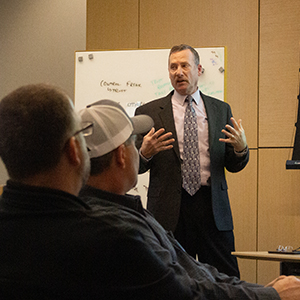Deal with the obstacles that prevent you
from successfully driving your projects.
This class meets two consecutive days.
August 6th and 7th, 2025
Leading and communicating within the delicate balance of personalities and talent in a project environment requires an astute understanding of the motivations, anxieties and goals of the team members you lead. Without the proper tools successful leaders employ, even the best planned project can end in failure. This useful program will equip project managers with the skills they need to lead and communicate effectively in a project environment, especially in projects where they don’t have direct authority over other members of the project team.
After completing this workshop, participants will be able to:
- Clearly identify the role of a project leader
- Understand how to conduct a stakeholder analysis
- Describe project vision, objectives and scope
- Understand how to exert influence
- Improve communications with team members and stakeholders
- Develop and execute a communication plan
- Explain how to handle internal and external conflicts
What is the role of a project leader?
- How does leadership differ from participation?
- Important qualities of an effective project leader
- The four phases of transition to leadership
How to conduct a stakeholder analysis
- Identify stakeholders
- What do you need from each stakeholder?
- What information do stakeholders need about the project?
What is your natural leadership style?
- A structured approach
- A consideration approach
Why vision, objectives and scope are important
- Project objectives should be specific and measurable
- Are performance measures clear?
- Do all stakeholders understand and support the project?
- How to determine project success
How to increase your influence with your team and stakeholders
- Eight ways members and stakeholders may resist your influence
- Six influence tactics
- Six conditions of a highly motivated project team
How to improve your personal communication skills
- How a communication model can explain failures
- How to give and receive feedback
Communications planning and management
- Tools and techniques for communicating with stakeholders
- The communications management plan
- Tools and techniques for distributing information
- Performance reporting tools and techniques
How to conduct effective project team meetings
- Encourage participation from less verbal members
- How to handle dominate members
How to resolve conflict within the team and among stakeholders
- What causes project teams to disintegrate?
- How to tell if your team is heading toward trouble
- How to turn impasses into acceptable solutions
“A lot of good information on how to develop the soft skills that are needed by a project manager in leading a team. Dr. Graham brings a lot of personal experience to the classroom which I feel is really beneficial.”
Michael Shaheen, Project Manager, Wichita, Kansas
“Dr. Graham always rocks! He makes you think about things in a different way.”
Dana Adams, Project Manager, Koch Business Solutions, Wichita, Kansas
Project managers as well as program managers, can benefit from this two-day class. If you lead a team, or coordinate an event, or work a major project, this class will help you understand and be able to cover the multiple aspects of strong communications.
Substitutions are free and must be done prior to the start of the class or certificate program.
Cancellations or rescheduling must be received in writing and full refunds will be given up to four business days prior to the start of class.
Any cancellation or reschedule submitted with three or less business days notice is subject to a $35 charge on 1 or 2 day classes and a $75 charge on certificate programs.
No refunds after the first day of the class or certificate program.


